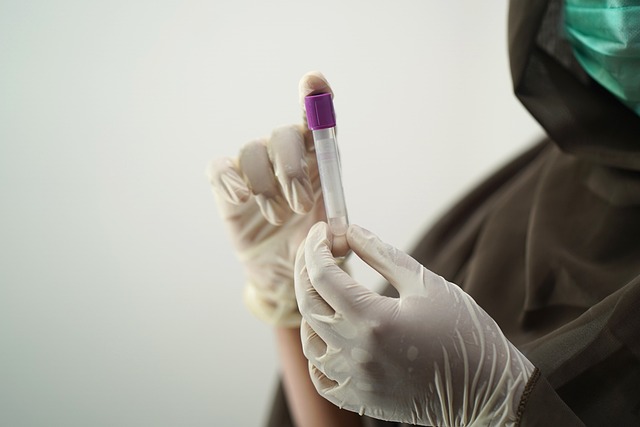The UK Cholesterol Blood Test is a valuable diagnostic tool for assessing reproductive health and hormonal balance. It non-invasively measures key hormones such as estrogen, progesterone, FSH, LH, and cholesterol levels, which are crucial for understanding fertility issues like irregular periods or difficulty conceiving. This test helps healthcare providers identify hormonal imbalances, aiding in the early diagnosis of conditions like PCOS or thyroid disorders. It is instrumental in monitoring hormone levels over time to track treatment progression and optimize interventions. The comprehensive analysis of both hormonal markers and lipid profiles enables personalized treatment plans, improving chances for successful conception and overall reproductive health management. The UK's healthcare system, including the NHS, has integrated this test into its guidelines for fertility support, ensuring access to consistent and reliable hormone testing. Beyond fertility, the test also assesses cholesterol levels, which is beneficial for cardiovascular health risk assessment, offering a holistic health perspective.
Navigating reproductive health challenges can be a complex journey for many individuals. The UK Cholesterol Blood Test emerges as an invaluable tool in this realm, offering insightful hormone analysis that can pinpoint underlying fertility issues. This article delves into the transformative role of this test in deciphering reproductive health dynamics, elucidating its mechanism for identifying hormonal imbalances, and integrating it within comprehensive care strategies in the UK. Understanding these aspects is crucial for empowering individuals with the knowledge to make informed decisions about their reproductive health and fertility treatments.
- Decoding Reproductive Health through Hormone Analysis: The Role of the UK Cholesterol Blood Test
- Understanding the Mechanism: How a UK Cholesterol Blood Test Can Identify Hormonal Imbalances Impacting Fertility
- Integrating Hormone Analysis with Reproductive Health Care in the UK: A Comprehensive Approach to Diagnosis and Treatment
Decoding Reproductive Health through Hormone Analysis: The Role of the UK Cholesterol Blood Test

Understanding reproductive health often hinges on the delicate balance of hormones within the body. Hormone analysis, a critical diagnostic tool, provides insights into the complex interplay of these chemicals that govern reproductive functions. The UK Cholesterol Blood Test plays an indispensable role in this realm, offering a non-invasive window into hormonal health. This test measures key hormones and cholesterol levels, which are pivotal for ovarian function and egg quality in women. For those experiencing reproductive issues, such as irregular menstrual cycles or difficulty conceiving, the UK Cholesterol Blood Test can help identify imbalances that may be contributing factors. It assesses hormones like estrogen, progesterone, follicle-stimulating hormone (FSH), and luteinizing hormone (LH), all of which are essential for a healthy reproductive cycle. Additionally, evaluating cholesterol levels is crucial as it is a precursor to the synthesis of sex hormones. By providing comprehensive data on these hormonal markers and lipid profiles, healthcare providers can tailor treatment plans to address individual needs, thereby enhancing the chances of conception and improving overall reproductive health outcomes.
The utility of the UK Cholesterol Blood Test extends beyond initial diagnosis; it is also an invaluable tool for monitoring treatments over time. Reproductive issues often require a nuanced approach, with hormone levels fluctuating in response to interventions such as fertility medications. Regular testing allows for the fine-tuning of treatments, ensuring that hormone levels are optimized for conception. The test’s ability to detect subtle changes in hormonal balance can mean the difference between successful and unsuccessful treatment cycles. Furthermore, it aids in the early detection of conditions like polycystic ovary syndrome (PCOS) or thyroid disorders, which can have profound effects on fertility. The UK Cholesterol Blood Test’s role in decoding reproductive health through hormone analysis is not only significant but also indispensable for those seeking to understand and address their reproductive concerns.
Understanding the Mechanism: How a UK Cholesterol Blood Test Can Identify Hormonal Imbalances Impacting Fertility

A UK Cholesterol Blood Test plays a pivotal role in diagnosing hormonal imbalances that can affect fertility. This test measures the levels of various sterols and lipids within the bloodstream, which indirectly reflect the activity of the endocrine system responsible for hormone production. By assessing these markers, healthcare professionals can discern anomalies indicative of dysfunction in the hypothalamic-pituitary-ovarian (HPO) or hypothalamic-pituitary-testicular (HPTA) axes, which are crucial for reproductive health. For instance, elevated androgen levels in women can be a sign of polycystic ovary syndrome (PCOS), a common cause of infertility. Similarly, imbalances in luteinizing hormone (LH) and follicle-stimulating hormone (FSH) can indicate issues with ovulation. The UK Cholesterol Blood Test, thus, serves as an initial diagnostic tool, enabling timely intervention and personalized treatment plans to optimize fertility outcomes.
Understanding the mechanism behind hormonal imbalances through a UK Cholesterol Blood Test is not only about identifying the problem but also about interpreting the results within the broader context of an individual’s overall health. It is essential for clinicians to consider additional factors, such as diet, lifestyle choices, and other medical conditions that may influence hormone levels and fertility. This holistic approach ensures a comprehensive evaluation, leading to more accurate diagnoses and effective management strategies for those facing reproductive challenges.
Integrating Hormone Analysis with Reproductive Health Care in the UK: A Comprehensive Approach to Diagnosis and Treatment

In the United Kingdom, hormone analysis plays a pivotal role in the comprehensive approach to reproductive health care. The integration of advanced hormone diagnostic tests, such as the UK Cholesterol Blood Test, allows healthcare providers to accurately assess hormonal imbalances that can affect fertility and overall reproductive health. These tests measure key hormones like follicle-stimulating hormone (FSH), luteinizing hormone (LH), estrogen, and progesterone, providing insights into ovulation, menstrual cycle regularity, and ovarian reserve. The data obtained from these analyses are instrumental in tailoring treatment plans that address the underlying hormonal issues, thereby enhancing the effectiveness of fertility treatments and improving patient outcomes. This methodical integration of hormone analysis ensures that reproductive health care in the UK is informed by precise biological data, leading to personalized and effective interventions for individuals experiencing reproductive challenges.
Furthermore, the UK’s National Health Service (NHS) has established guidelines and protocols for the administration of hormone analysis within reproductive health care pathways. These protocols ensure that all women seeking fertility assistance can access consistent and reliable hormone testing services, including the UK Cholesterol Blood Test. This test is particularly relevant as it not only assesses reproductive hormones but also evaluates cholesterol levels, which are critical to understanding a patient’s overall health and risk factors for conditions like heart disease. By combining these analyses, healthcare professionals can deliver a holistic treatment plan that addresses both the reproductive and metabolic aspects of a patient’s health, thereby providing comprehensive care that supports not just fertility but also long-term well-being.
In conclusion, hormone analysis through a UK Cholesterol Blood Test is a critical tool in deciphering reproductive health issues. By illuminating hormonal imbalances that can affect fertility, healthcare providers in the UK can offer more tailored and effective interventions. The integration of this diagnostic method within the broader reproductive health care framework underscores a comprehensive approach to managing fertility concerns. This not only enhances patient outcomes but also underscores the importance of accessible and precise endocrine assessment as part of modern reproductive medicine.
